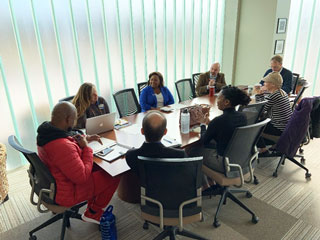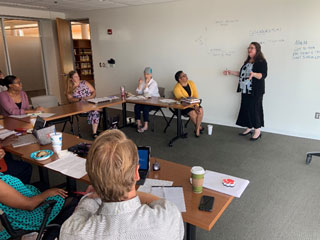Project M.O.S.T. students take time out to relax and de-stress during fall 2019 finals week.

President Dr. Tracy D. Hall and Dean of Faculty Support Jeremy Burnett met with members of the HIPI team Nov. 8 to discuss how their classroom instruction is boosting student engagement and success.
Enhancing teaching and learning by providing culturally responsive and supplemental instruction methods is essential to the success of any student. In core courses with high failure rates, it is not only essential, but also is critical to the student’s completion.
High Impact Practices (HIPs) is a method of teaching that deepens the way students learn by incorporating into their curriculum programs such as first-year seminars, internships, undergraduate research, ePortfolio, learning communities, collaborative assignments, capstone courses and study abroad. HIPs has been shown to positively affect a student’s educational outcomes and increase retention and student engagement, especially for underrepresented minorities and first-generation college students.
On Nov. 8, President Dr. Tracy D. Hall met with members of Southwest’s HIPI (High Impact Practices and Innovation) team to discuss the importance of their work in implementing HIPs teaching strategies in the classroom. “I’m really excited about the work that is going on,” she said. “HIPs is going to be a “game changer” for the College in bringing about greater student success, especially for those students in gatekeeper courses.”
Faculty are excited by the $2.1 million Strengthening Institutions Program (SIP) grant the College received last November that will help bolster HIPs instruction. Funding will be used over the next five years to support ongoing efforts to close equity and achievement gaps between white and minority students in course success, retention and graduation.

TBR High Impact Practice Specialist Dr. Melynda Conner spoke to faculty about efforts to implement HIPs at a workshop Nov. 13 on the Macon Cove Campus.
HIPI Coordinator Matthew Lexow said the College is already ahead of other community colleges in Tennessee in implementing HIPs. “We are the only one that has all of the high-end practices in one location,” Lexow said. Undergraduate Research Coordinator and Professor of Natural Sciences Dr. Juliann Waits told Hall there are several courses currently running that incorporate undergraduate research and group projects. “In the spring, we anticipate presenting the students’ projects at the undergraduate research center here on campus,” Waits said. Learning Communities Coordinator Tracy McLaughlin added that the College will have seven learning communities in the spring. “I am excited about all of them for different reasons,” McLaughlin said. “Every single one of them has its own personality.”
First Year Experience Coordinator Dr. Levertis Meeks, who teaches many of the high fail courses, said he has been involved in a new student leadership workshop series that all incoming freshman have to participate in, and is planning to hold a recognition ceremony for first year students who have matriculated successfully into their second year. “We have a great program with the first year experience and I think Fall 2020 will be even more robust,” Meeks said.
In This Issue...
- FROM THE PRESIDENT
- Southwest Foundation takes center stage at cityCURRENT Signature Breakfast
- Welcome aboard, new team members
- Human Resources to kick-off redesign of employee experience in 2020
- MENTAL HEALTH CORNER: Charting a new path
- HIPs teaching methods a ‘game changer’ for student success
- Project M.O.S.T. hosts “De-Stress” fest during finals
- SGA Angel Tree Program brings holiday spirit to Alton Elementary students
- FACULTY: Schedule Library Instruction session for your students today
- STUDENTS: Print 2019 Tax Forms in My.Southwest portal
- AACC names Chef Steven Leake a 2020 Dale P. Parnell Distinguished Faculty recipient
- KUDOS: Memphis Grizzlies select VP of Student Affairs Jacqueline Faulkner for annual HBCU Empowerment Award
- US Secret Service trains Southwest SERT team on workplace security
- U.S. State Department selects Dr. Christopher Hastings specialist assignment
- THEC awards Southwest and TCAT-Memphis $145K Veteran Reconnect grant
- Writers series showcases works by Southwest faculty
- Students travel to state capitol to learn law-making process
- Early FAFSA completers win book scholarships
- Culinary arts graduate opens ‘Cool Beans’ coffee shop in Cordova
- Southwest and TCAT-Memphis tout growth and expansion at 2020 Legislative Luncheon
- Southwest establishes Innovation Funds to fuel success; Now accepting grant applications
- Scholarship recipients thank Foundation donors for making dreams come true
- Southwest celebrates the holidays with faculty and staff open house
- Women of Worth accepting new members
- Shelby County Government and Southwest Allied Health and Sciences drill nursing students on disaster triage
- Business and Technologies joins National Cyber Watch Center
- SALUQI CORNER: Saluqis start new year with impressive wins
- Southwest: In the News
- 32nd Annual Carter G. Woodson Award Ceremony is Feb. 13